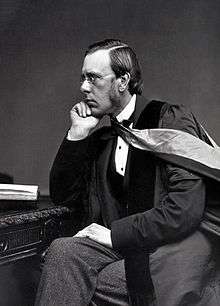William Tennant Gairdner


Sir William Tennant Gairdner (8 November 1824 – 28 June 1907) was a Professor of Medicine in the University of Glasgow.[1]
Personal life
William Tennant Gardiner was the son of Dr. John Gairdner, a physician in Edinburgh, and was born there on 8 November 1824. He was the elder brother of the historian James Gairdner. He was educated at the Edinburgh Institution and then in his father's profession at the University of Edinburgh, graduating as M.D. in 1845.[2][3] He was taught surgery by Prof Monro and Dr Robert Halliday Gunning.[4]
In 1870 he married Miss Helena Bridget Wright, of Norwich, Norfolk who survived him. He had four sons (William Henry Temple, Hugh Montgomerie, Eric Dalrymple, Anthony Philip) and three daughters (Helen Christian, Ailsa Bridget, Dorothea).[2][5][6] Dr. Douglas Montagu Temple Gairdner was his grandson.
Medical career
In 1850 he was elected a Fellow of the Royal College of Physicians of Edinburgh; and a year or two later was appointed physician and pathologist to the Royal Infirmary of Edinburgh. He filled these offices until 1862, when he accepted an invitation to take the professorship of medicine in the University of Glasgow, together with the post of physician to the Western Infirmary. In the following year much attention was directed in Glasgow to the insanitary state of the city; and Dr. Gairdner, at considerable pecuniary sacrifice, undertook the duties of medical officer of health, which he discharged for ten years in such a manner as brought about a total change in the conditions which he found existing. From this time forward he devoted himself to the duties of his professorship and to his increasing consulting practice.[2]
The professor of medicine in a University like that of Glasgow is expected, almost as a matter of course, to be become an important contributor to the advancement of the science which he teaches, and his duty Gairdner abundantly fulfilled. He did excellent work in this direction both as a sanitarian, as an original investigator of diseases of the heart, and in opposition to the excessive alcoholic stimulation of fevers, which had been rendered fashionable for a time by the teaching of Dr. Todd. His personal influence over successive generations of students was, however, greatly more remarkable and more important than his purely medical achievements.[2]
In 1893 he was elected President of the Royal College of Physicians of Edinburgh [7] and a Fellow of the Royal Society[8] The same year he was appointed honorary physician in ordinary in Scotland to Queen Victoria, receiving the corresponding appointment on the accession of King Edward VII.[9] He was made Knight Commander of the Order of the Bath in 1898,[10] and in 1890 resigned his professorship and took up his residence in Edinburgh.[2]
He was president of the British Medical Association in 1888, representative of the University of Glasgow in the General Medical Council for ten years from 1893 to 1903, and among other distinctions received the degree of LL.D. Edin. in 1883 and that of M.D. Dublin (honoris causa), with the honorary Fellowship of the Royal College of Physicians of Ireland, in 1887.
Works
| Wikisource has original works written by or about: Sir William Tennant Gairdner |
His principal works were Clinical Medicine, 1862; Public Health in Relation to Air and Water, 1862; On Some Modern Aspects of Insanity, Lectures to Practitioners (jointly with Dr. J. Coats), 1868; The Physician as Naturalist, 1889; and The Three Things that Abide, 1903.
At the time of his death it was stated that "his book The Physician as Naturalist, if not written with any idea of self-portraiture, at least contains a large amount of self-revelation; while his last publication, The Three Things that Abide, is made up of lay sermons on faith, hope, and love, of no common interest and beauty."[2]
| Academic offices | ||
|---|---|---|
| Preceded by Alexander Russell Simpson |
President of the Royal College of Physicians of Edinburgh 1893–1895 |
Succeeded by John Batty Tuke |
References
- ↑ "GAIRDNER, Sir William Tennant". Who's Who. 59: 651. 1907.
- 1 2 3 4 5 6 "Obituary. Sir W. Gairdner.(transcript)" (38373). London: The Times. 1 July 1907. p. 7; col D.
- ↑ McC., J. (1912). "Sir William Gairdner". Canadian Medical Journal Association Journal. The Canadian Medical Association. Retrieved 28 July 2015.
- ↑ https://www.royalsoced.org.uk/cms/files/research_awards/prizes/prize_lists/gunning_victoria_history.pdf
- ↑ Scottish 1881 census. Parish: Glasgow Govan; ED: 108; Page: 5; Line: 1; Roll: cssct1881_238; Year: 1881.
- ↑ Scottish 1891 census. Parish: Glasgow Govan; ED: 121; Page: 4; Line: 1; Roll: CSSCT1891_280; Year: 1891.
- ↑ Lee, Thomas Alexander. Seekers of Truth: The Scottish Founders of Modern Public Accountancy. p. 143.
- ↑ Sir William Tennant Gairdner, Fellow of the Royal Society
- ↑ The London Gazette: no. 27300. p. 2194. 29 March 1901.
- ↑ "New Year Honours" (35402). London: The Times. 1 January 1898. p. 6; col B., note that obituary incorrectly states 1880